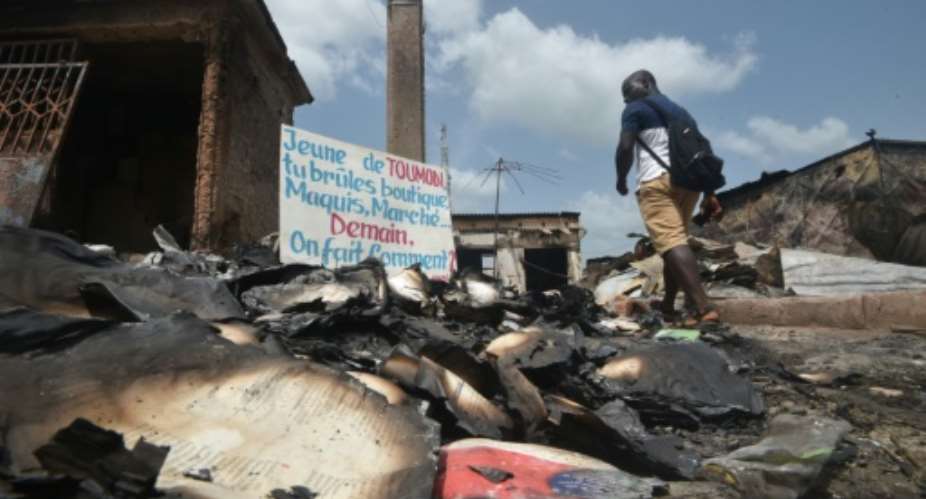Ivory Coast President Alassane Ouattara will meet his main rival on Wednesday for talks on ending election violence, the government said, as it updated the death toll from the clashes to 85.
Ouattara "will hold a meeting this afternoon with the president of the PDCI, Mr. Henri Konan Bedie, at 5pm," Communications Minister Sidi Tiemoko Toure said, referring to Bedie's Ivory Coast Democratic Party.
Ouattara, 78, won the October 31 election with more than 94 percent of the vote.
But he also faces deep anger among opposition supporters, who say he breached the country's two-term presidential limits.
Deadly violence -- often tinged by ethnic rivalry -- erupted in August after Ouattara announced his bid for a third spell in office, arguing that a 2016 revision of the constitution reset the term counter to zero.
Toure told reporters that the official toll now stood at 85 dead and 484 injured, many of them in the southeast of the country.
Of the fatalities, 34 occurred before the election, 20 on voting day and 31 afterwards.
He added that 225 people had been arrested, of whom 45 were in custody and 167 had been charged.
The opposition has refused to acknowledge the results of the election, launched what it calls a campaign of civil disobedience and vowed to set up a transitional government to replace Ouattara.
Traumatic memories
Several opposition leaders, including former prime minister Pascal Affi N'Guessan, the opposition's spokesman, have been arrested, and the homes of others are being blockaded by security forces.
For many Ivorians, painful memories have stirred of the aftermath of disputed elections in 2010.
A political standoff was followed by a brief civil war in which around 3,000 people died and an estimated 1.3 million people fled their homes.
The announcement of the meeting between Ouattara and Bedie, an 86-year-old former president, comes amid a clamour from international bodies and Ivory Coast's neighbours for efforts to ease the tension.
The country is the world's top cocoa producer, francophone West Africa's largest economy and its major city, Abidjan, is a regional business hub.
More than 8,000 people have streamed out of the country to seek refuge in neighbouring states, especially Liberia, the UN"s refugee agency said on Tuesday.
More than half of them are children, many of whom have arrived unaccompanied or separated from their parents.
Conditions
Ouattara, in a speech on Monday, proposed a meeting with Bedie, whom he respectfully described as his "elder."
In its response, the PDCI on Wednesday set down several conditions for such talks, including the lifting of the home blockades and the end of judicial procedures against arrested leaders.
 Ivory Coast. By (AFP)
Ivory Coast. By (AFP)
The blockade around Bedie's home had been lifted as of early afternoon on Wednesday, but was still in place around the home of fellow opposition leader Assoa Adou, Adou told AFP.
Ouattara and Bedie have been central figures in Ivorian politics for decades, with each claiming the mantel of Felix Houphouet-Boigny, the highly popular first post-independence president.
The venue for their meeting has historic resonance.
It is the Golf Hotel in Abidjan, where Ouattara, as president-elect, set up his headquarters during the 2010-11 crisis, when the incumbent president, Laurent Gbagbo, refused to step down after being defeated at the ballot box.
Ouattara's erstwhile allies at the hotel included Bedie, who fell out with Ouattara in 2018.





 Dumsor: Mathew Opoku Prempeh has been disrespectful, he should be fired – IES
Dumsor: Mathew Opoku Prempeh has been disrespectful, he should be fired – IES
 NPP prioritizing politics over power crisis solution — PR Strategist
NPP prioritizing politics over power crisis solution — PR Strategist
 E/R: Gory accidents kills 3 persons at Aseseaso, several others critically injur...
E/R: Gory accidents kills 3 persons at Aseseaso, several others critically injur...
 Nobody can come up with 'dumsor' timetable except Energy Minister – Osafo-Maafo
Nobody can come up with 'dumsor' timetable except Energy Minister – Osafo-Maafo
 Dumsor: You ‘the men’ find it difficult to draw timetable when ‘incompetent’ NDC...
Dumsor: You ‘the men’ find it difficult to draw timetable when ‘incompetent’ NDC...
 We’re working to restore supply after heavy rains caused outages in parts of Gre...
We’re working to restore supply after heavy rains caused outages in parts of Gre...
 NPP government plans to expand rail network to every region — Peter Amewu
NPP government plans to expand rail network to every region — Peter Amewu
 Dumsor must stop vigil part 2: We’ll choose how we demonstrate and who to partne...
Dumsor must stop vigil part 2: We’ll choose how we demonstrate and who to partne...
 2024 elections: NDC stands on the side of morality, truth; NPP isn't an option —...
2024 elections: NDC stands on the side of morality, truth; NPP isn't an option —...
 Akufo-Addo has moved Ghana from 'Beyond Aid' to ‘Beyond Borrowing’ — Haruna Idri...
Akufo-Addo has moved Ghana from 'Beyond Aid' to ‘Beyond Borrowing’ — Haruna Idri...
